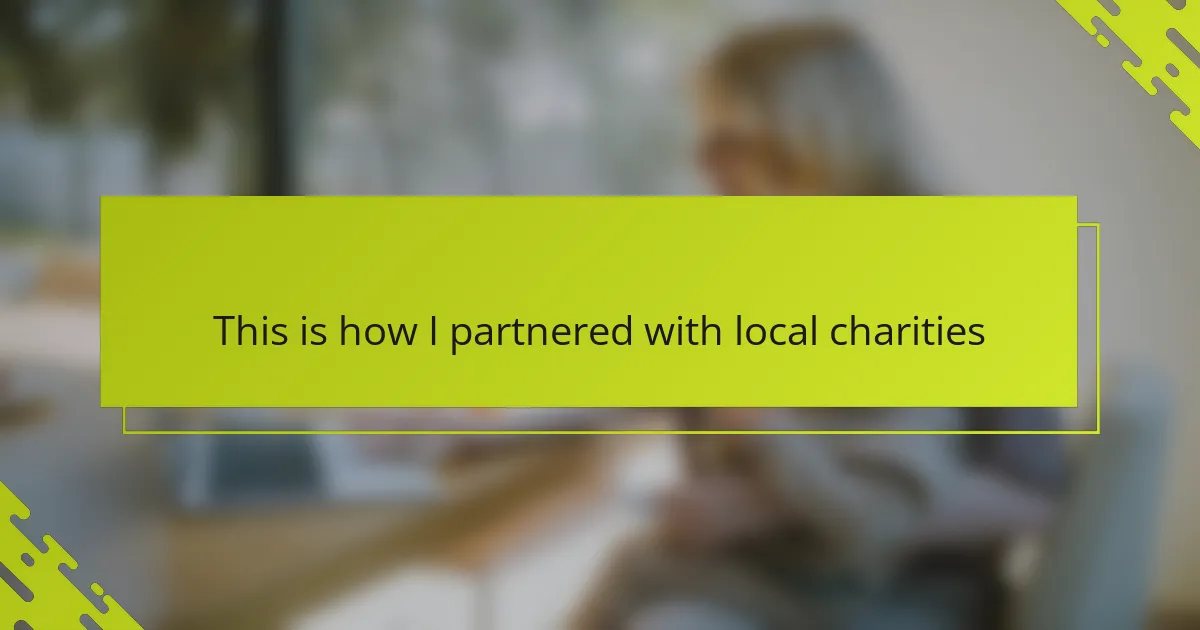Key takeaways
- Queer women culture emphasizes connection and resilience, highlighting the importance of community and shared stories.
- Local charities play a crucial role in supporting marginalized groups by offering tailored assistance and fostering a sense of belonging.
- Building effective partnerships requires trust, flexibility, and open communication, allowing for genuine collaboration and mutual growth.
- Sustainable collaboration is grounded in consistent presence and adaptability to meet the evolving needs of local organizations.
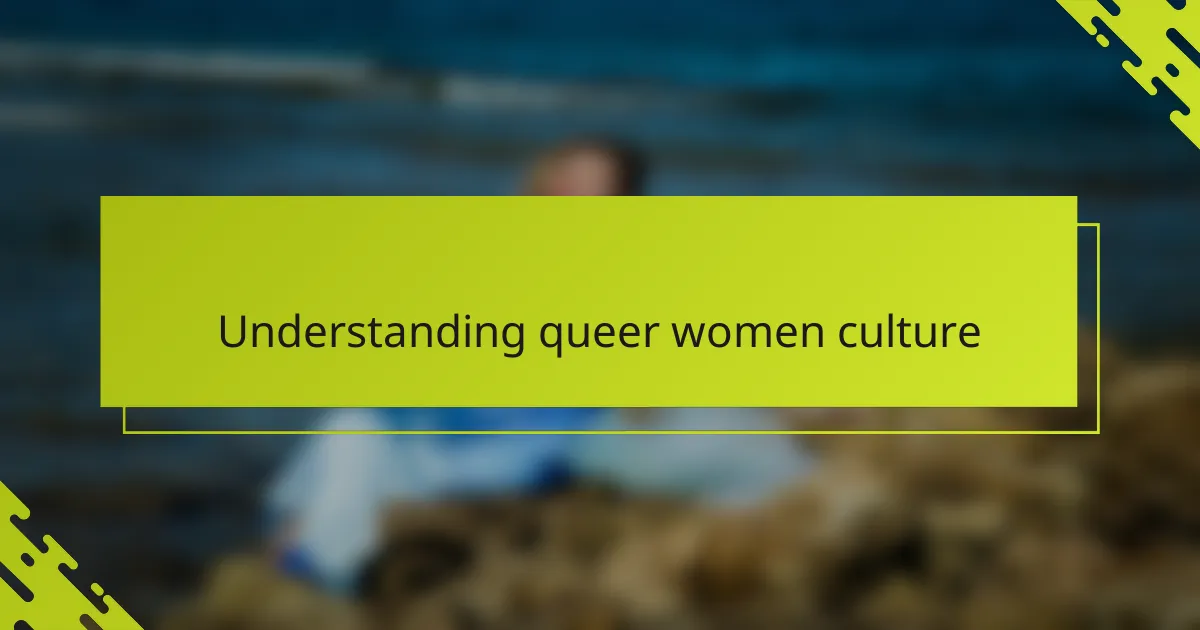
Understanding queer women culture
Queer women culture is rich, diverse, and constantly evolving. From my conversations with friends in the community, I’ve realized how vital it is to honor both shared experiences and unique personal stories within this culture. It’s not just about identity; it’s about connection, resilience, and creating spaces where everyone feels seen.
Have you ever wondered what it truly means to belong somewhere, especially when mainstream culture often overlooks you? For me, understanding queer women culture meant learning to listen deeply—to the laughter, the struggles, the nuances that don’t always fit into simple categories. That’s where the heart of the culture beats strongest.
What strikes me most is the blend of activism and creativity that pulses through queer women culture. I’ve seen this firsthand in community events where art becomes activism, and friendships turn into chosen families. It’s a space that invites both celebration and challenge, and engaging with it has changed how I see the power of community.
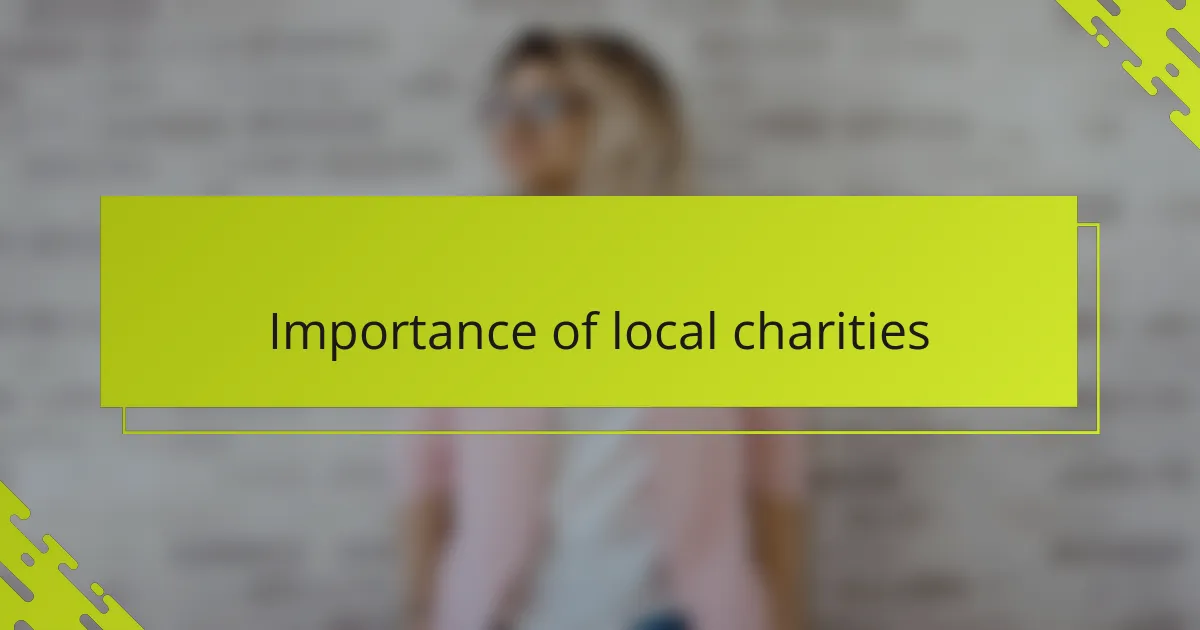
Importance of local charities
Local charities often serve as the lifeblood of any community, especially for marginalized groups like queer women. I remember meeting a local organization that not only provided resources but also created a sense of belonging for people I knew. It made me realize how these charities fill gaps that larger institutions often overlook.
Have you noticed how support from local charities feels more intimate and tailored? Unlike bigger entities, they understand the nuances of our community’s needs because they live them too. This connection creates trust, which is so important when seeking help or collaboration.
For me, the real power of local charities lies in their ability to adapt quickly and respond with empathy. I’ve seen them mobilize during crises and celebrate milestones with real heart. It’s this spirit that reminds me why partnering with them isn’t just charity—it’s building a stronger, more connected community.
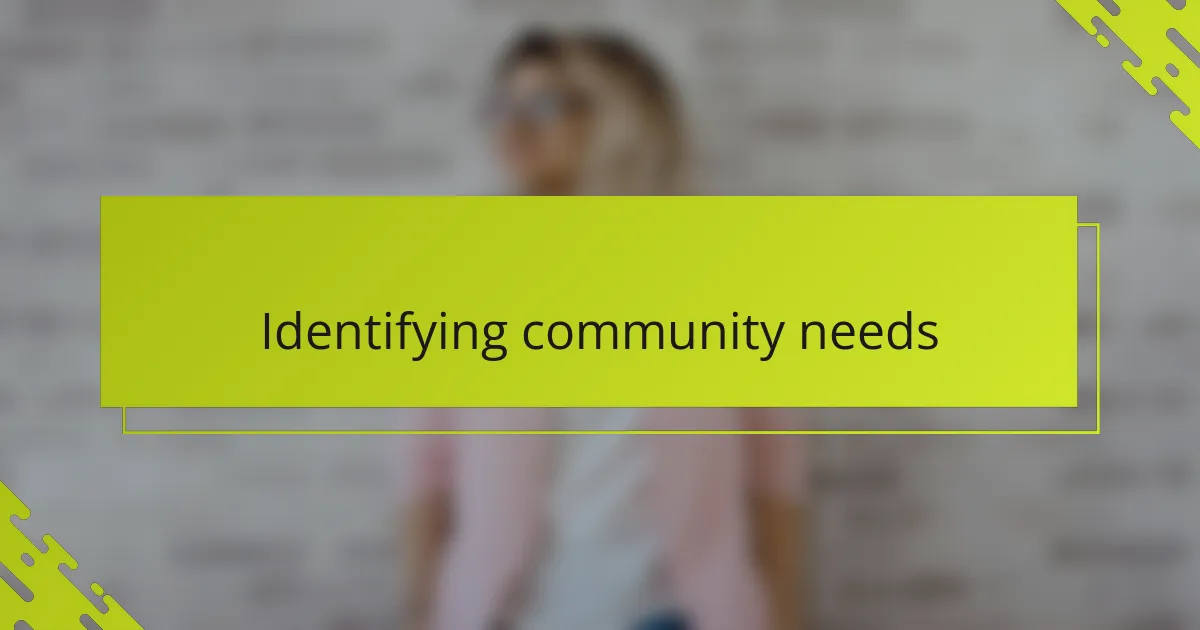
Identifying community needs
When I first thought about partnering with local charities, I knew understanding what the community truly needed was the starting point. It wasn’t enough to assume or guess; I needed to listen deeply to the voices around me, especially those often unheard within queer women spaces. Have you ever felt overlooked even within a group you belong to? That’s exactly why pinpointing needs matters so much.
One moment that really opened my eyes was attending a grassroots meeting where community members shared their day-to-day challenges—everything from healthcare access to safe social spaces. Hearing these stories firsthand, I realized how diverse and specific those needs were. It made me appreciate that effective support comes from acknowledging this complexity, not from a one-size-fits-all approach.
Identifying these needs also meant asking tough questions: What gaps exist that no one is addressing? Who might be left behind? Reflecting on these helped me appreciate the nuance involved and reminded me that meaningful partnerships start with humility and genuine curiosity. Without that foundation, efforts risk missing the mark entirely.
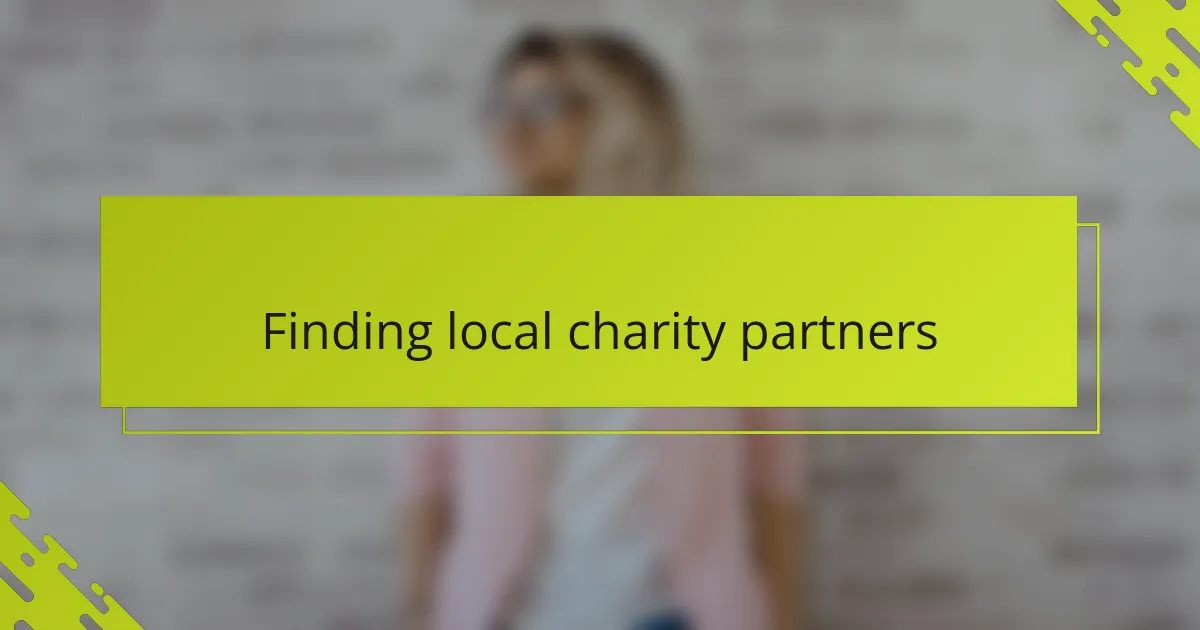
Finding local charity partners
Finding local charity partners felt like stepping into a new world for me. I started by asking around—talking to people I trusted within the community and attending local events where those who dedicate themselves to service gather. Have you ever found that the best connections often come through word of mouth rather than formal directories? That was definitely the case here.
What struck me was how approachable these organizations were once I reached out. One afternoon, I remember sitting down with the founder of a small queer-focused charity in a cozy café, and that conversation instantly felt like the start of something meaningful. It wasn’t just about logistics; it was about shared values and a sincere desire to uplift our community together.
I realized early on that the key to finding the right partners wasn’t just in the mission statement but in the people behind it—their passion, openness, and understanding of queer women’s unique experiences. Isn’t that what truly makes a partnership thrive? This approach shaped how I connected with local charities, emphasizing genuine relationship-building over transactional contacts.
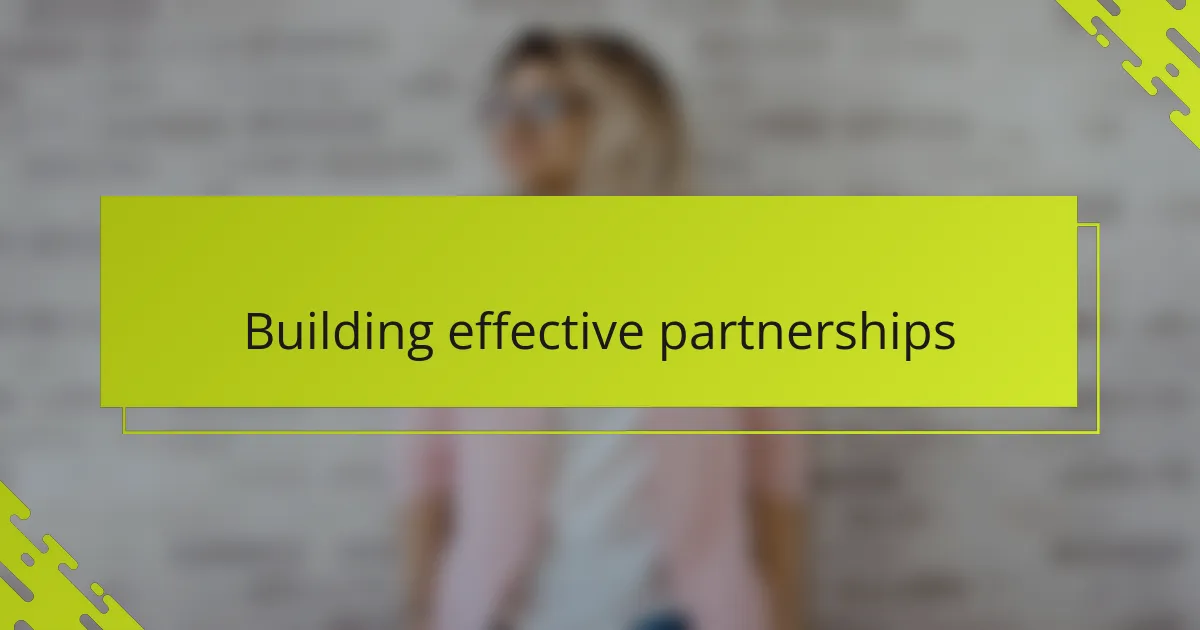
Building effective partnerships
Building effective partnerships requires more than just aligning goals; it’s about nurturing trust and authentic connection. I found that taking time to listen and understand each charity’s values created a foundation where collaboration felt natural rather than forced. Have you ever noticed how partnerships flourish when everyone feels genuinely heard?
In my experience, flexibility has been key. Local charities often operate with limited resources, so adapting plans to fit their rhythms made all the difference. For instance, I learned that sometimes showing up consistently, even without immediate results, builds credibility and opens doors over time.
What really surprised me was how sharing my own learning curve encouraged openness on both sides. Being transparent about challenges invited a spirit of teamwork and mutual support that strengthened our efforts. Isn’t partnership ultimately about growing together rather than going it alone?
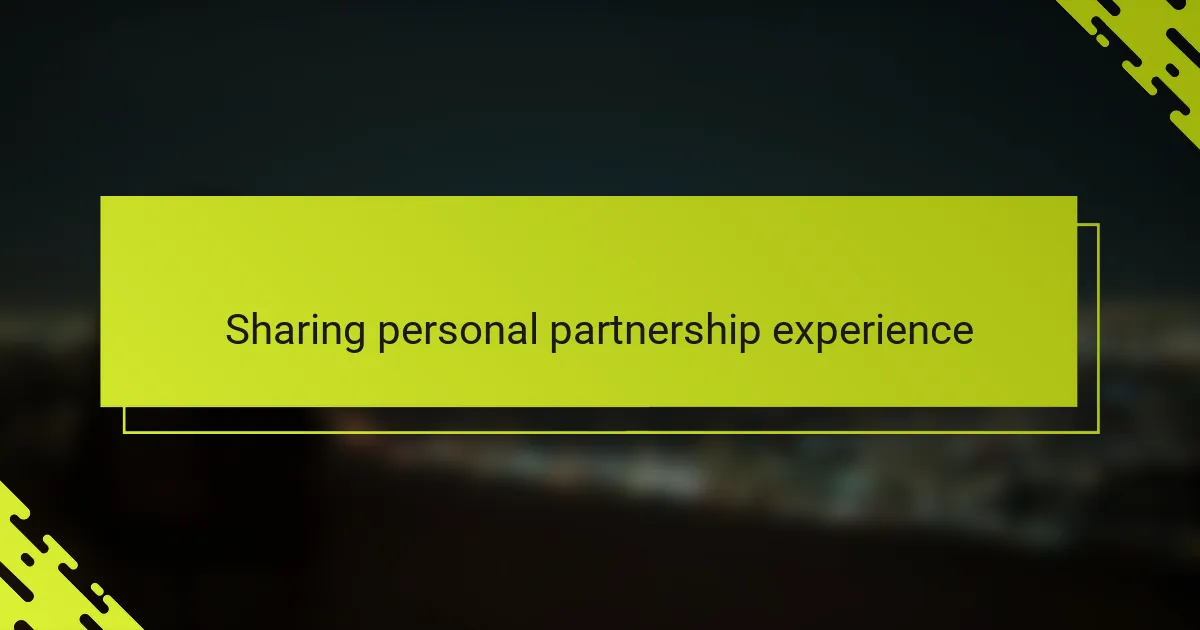
Sharing personal partnership experience
When I first stepped into these partnerships, I was honestly nervous—wondering if I could really contribute in a meaningful way. But sitting down with charity leaders and hearing their stories made me realize we all shared a common goal: supporting queer women in ways that truly matter. Have you ever experienced that moment when connection suddenly feels effortless, like you’re exactly where you’re supposed to be?
I remember one meeting where a small charity shared their struggles with limited funding but immense passion. Their dedication moved me, and I knew then that this partnership wasn’t just about what I could offer, but about standing together through challenges. It felt less like collaboration and more like building something heartfelt and lasting.
What surprised me most along the way was how much I learned—not just about the community, but about patience, vulnerability, and trust. Sharing our journeys openly created a space where growth felt mutual. Doesn’t that give true meaning to the idea of partnership?

Tips for sustainable collaboration
One thing I’ve learned is that sustainable collaboration thrives on consistency. Showing up regularly, even when progress seems slow, builds trust over time. Have you ever noticed how just being present can sometimes say more than words? That steady presence signals commitment and respect, which local charities deeply appreciate.
Another tip is to keep communication open and honest. I’ve found that transparent conversations about challenges, expectations, and boundaries prevent misunderstandings before they arise. When one partner shares their struggles openly, it creates space for real teamwork—don’t you think that’s the heart of any lasting relationship?
Finally, I believe flexibility is essential in partnerships with local charities. Their resources and capacities might shift, so adapting your plans and timelines helps maintain momentum without adding pressure. I remember a time when shifting gears to support a charity’s urgent need actually strengthened our bond—sometimes being responsive beats sticking rigidly to plans.
